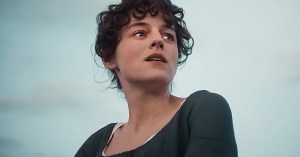7 Revelations We Learned from the Cast of Orphan Black
Felix, Mrs. S, Paul, and Mark (Seth, Rudy, and Miller) answer burning questions about season three
During a sit-down at Chicago’s C2E2 convention this weekend with Orphan Black creator John Fawcett and cast members Ari Millen, Dylan Bruce, Maria Doyle Kennedy, and Jordan Gavaris, Rotten Tomatoes uncovered the answers to some of season three’s most pressing questions. [Warning: Contains spoilers for the first two episodes of Orphan Black season three.]
What’s Up With Helena’s Scorpion?

“I like to think of it as a spirit guide for them,” said John Fawcett, co-creator and director of Orphan Black. The scorpion, which comes from Helena’s point of view, is also performed by Maslany (one more character to add to her roster). “A scorpion makes this sort of purring, clicking sound,” Fawcett explained. “She did all the layers of those sound effects on top of [the voice], so she would do a purring which was sort of halfway between a cat and a velociraptor. Then we do a clicking track which she would just do with her mouth while the thing walked. Then she would do the vocal the voice. Then we would just layer them together; we would cut it all together. She really created the entire performance of the scorpion.” And while the scorpion only exists in Helena’s mind, that is a real scorpion on Maslany’s face. Give her the Emmy already!
What’s the Deal with Kira?

Maybe you’ve sensed that Kira (Skyler Wexler) has something special going on. But the cast isn’t about to cop to magical powers. “I don’t think anything in the Orphan Black universe is ever magical,” said Jordan Gavaris, who plays Sarah’s foster brother, Felix. “I don’t think we’re in elvish territory… I would maybe go as far as to use the word ‘alchemy,’ but what was considered magical 200 years ago is explained very easily by science now.” For Maria Doyle Kennedy (Mrs. S), being a fan of the show as much as she is a part of it, Kira has raised an eyebrow more than once. “I definitely was like, ‘Oh, look at the way she healed after that accident.’ I like that. I wonder how the hell she was made, what was the difference in [Sarah’s] DNA and therefore in Kira’s? I’m really hoping it’s going to go somewhere… Maybe we could cure diseases on our show.”
Why Did Rudy Kill Seth?

Ari Millen, who plays the male clones, including newcomers Rudy and Seth, explained the events of Saturday’s episode, “Transitory Sacrifices of Crisis,” as a “mercy killing.” Seth, having had a series of glitches, seemed to be heartlessly put down by his brother, Rudy. But Millen said it comes from a good place. “I really let it build with Rudy… to help create him because we’re introduced with Rudy and he’s this maniacal, scary guy that we see in this jail cell. For me, it was really important to make him more than just that and flesh him out. His interactions with Seth, his brother, the loving relationship that they had, and then the mercy killing, for me really helped find Rudy in a different way.” Millen also said that, had Seth survived, he might have been his favorite clone.
Why Does Mark Burn Off His Tattoo?

Mark, the Prolethean we met in season two, has a new dimension now that we know of his clone brothers — not just for us but for the actor too. “I didn’t know last season, obviously, that Mark was going to be a clone and I’m glad that I didn’t find out because I probably would have played him way differently,” Millen said. Not only did Mark dedicate his life to Henrik and run away with Gracie, but he also makes a symbolic (and excruciating) decision to blowtorch his Project Castor tattoo at the end of “Transitory Sacrifices of Crisis.” The reason? “The burning of the tattoo is just that one next step of distancing himself from his old life and trying to build the new one, the ideal one, with Gracie,” Millen explained.
Who Are the Bad Guys?

Orphan Black has no shortage of untrustworthy characters, and topping that list right now is Paul (Dylan Bruce). “Ultimately, [Paul] has a task and he has goals but he’s also answering to someone much higher up than we have yet to see,” Bruce said. “I really got who this guy was [this season]. I got why he did what he did the prior two seasons, good and bad.” And as evidenced this past week, he does have feelings for Sarah. As for good and bad, director Fawcett likes Orphan Black to exist in the gray areas. “There’s a bad guy and then you’re like, ‘Wait a second. Are they a bad guy? Why do I care about this person, then, if they’re so bad?'” Fawcett said. “A lot of it is really wanting to understand why people do the things they do.”
Is There a Plan for the Ending?

Fawcett, who co-created the series with Greame Manson, caused a stir when he said that Orphan Black is a five-season story. “I got a little spanked over that one,” Fawcett admitted. “Let’s say when we were initially designing this, yes, we were talking about five seasons. We were trying to design a story that would have a beginning, middle, and end.” So, for those doubting that Orphan Black has an endgame, Fawcett is adamant that it does. “I want to know how the thing ends so that we can be focused on telling a cohesive story. I think that’s what’s really important,” Fawcett said. “I don’t want this to feel like we’re just floating around and trying to invent stuff from season to season. It really needs to feel like we have a clear way that we’re going forward.”
What Is Orphan Black Saying About LIfe?

For Gavaris, Orphan Black upends so much about the normative narrative about being human. “I think, and I love this term, it’s about the mythology that we tell each other about what it means to be humans and how it’s just not true… The mythology of the man, the mythology of the woman, the mythology of the lesbian, the science geek, the gay man, the housewife, they’re all myths.” And the term “orphan” is not lost on Kennedy, who plays Sarah and Felix’s foster mother. “I think it’s about defining your family,” Kennedy said. “I think that’s what it’s really about, and about the fact that your family doesn’t need to be so crazy, lifestyle-brochure, nuclear type-one. It can be of many shapes and sizes or colors or formations or lots of different people in it.”
Orphan Black airs Saturday at 9 p.m. on BBC America. See reviews for season three here.






